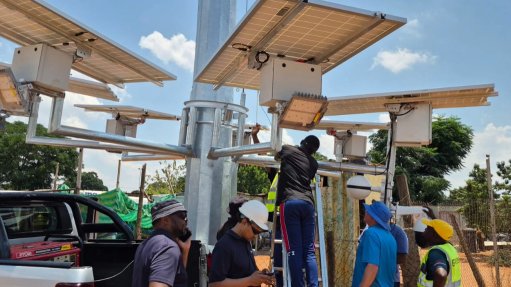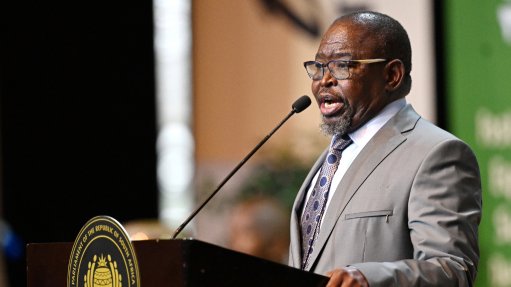Gauteng balancing finances, as first e-tolls debt due
It is a balancing act as Gauteng Provincial Treasury (GPT) works to prevent bankruptcy, pay down e-toll debt, mitigate an underperforming department, and work within a drastically reduced budget.
Speaking to media during a roundtable on Wednesday to discuss the finances of South Africa’s most populous province, Gauteng Finance and Economic Development MEC Lebogang Maile assured that the finances were in good hands and GPT had it under control, with work being undertaken to arrest and mitigate any decline.
In November, the province will table its Medium Term Budget, which provides the GPT an opportunity to balance the scales and adjust the province’s equitable share and conditional grants where needed.
The province is also accelerating its revenue enhancement strategy to raise more than R10-billion a year in own revenue.
Further discussing Gauteng’s audit outcomes and the state of finances of the Gauteng provincial government (GPG), Maile commented that the province's finances were monitored on a daily and weekly basis to ensure that any challenges were identified in time to intervene.
“Managing the budget is about agility. The money is always there, it is just how you manage the funds and how you prioritise it,” he said, warning, however, that, if caution was not taken, Gauteng could end up R6-billion in the red, and bankrupt by June next year.
“[However], the public funds are in good hands and balancing to make sure that we do not have a regression in the entities. Most of our entities are doing well, there are very few that are not doing well.”
With a R15-billion cut in budget and R20-billion required to be paid towards e-tolls, the provinces’ budget also faces R35-billion less to work with.
This as the first R3-billion installment is set to be paid, next week, towards e-toll debt.
The GPG accepted its 30% debt contribution to settle the South African National Roads Agency Limited’s debt and interest obligations, with national government covering the 70% balance, for the scrapped Gauteng Freeway Improvement Project tolling initiative.
Of the R20-billion required to be paid by the province towards the e-tolls, R12-billion is debt, R4-billion is interest and R4-billion is maintenance.
Further, the Gauteng Department of Health (GDoH) poses a “huge” threat to the budget.
The GDoH, with an unqualified audit opinion in the 2023/24 financial year, is the only department with noncompliance across all areas including grant management, revenue management, procurement and contract management, asset management and human resources.
“This indicates lack of effective internal control environment in multiple areas,” Maile commented, assuring that no more money would be allocated before efficiencies were improved, along with improved value for money for every service provided.
The GPT is “keeping things tight” to ensure no wastage and to hold people accountable.
Despite the bills stacking up and the poor performance of the GDoH – and weaknesses that need to be dealt with – not one of the 14 provincial departments or 19 entities in Gauteng received a qualified audit or adverse audit opinion.
In the 2023/24 financial year, seven departments received clean audit outcomes, including GPT and the Office of the Premier (OOP), as well as the departments of Cooperative Governance and Traditional Affairs, Economic Development (GDED), Education (GDE), eGovernment, and Community Safety (GDCS).
This is an improvement from the 2022/23 financial year, when six departments obtained clean audits. GDCS improved from an unqualified audit opinion to a clean audit.
While there are no regressions in the current year’s audit outcomes, there are notable stagnations on unqualified audit opinions, with the seven remaining departments recording unqualified audit opinions with findings.
This included the GDoH, along with the departments of Infrastructure Development, Human Settlements (GDHuS), Social Development (GDSD), Agriculture, Rural Development and Environment (GDARDE), Roads and Transport (GDRT) and Sports, Arts, Culture and Recreation (GDSACR).
“For departments that received unqualified audit opinions with findings, material noncompliance with supply chain management legislation and expenditure were the main challenge. This noncompliance leads to increased instances of irregular expenditure, which has an adverse effect on the departments’ financial health.”
Further, five of the departments with unqualified audit opinions, namely GDoH, GDSD, GDHuS, GDRT and GDSACR, have a challenge with consequence management, indicating that recommendations from completed investigations have not been implemented.
In addition to this, material misstatements in the annual financial statements is an issue in eight of the provincial departments. This indicates weak internal controls and a lack of adequate management reviews in the financial reporting processes.
In the 2023/24 financial year, 14 entities received clean audit outcomes, representing 74% of all entities in the provincial government.
This is an improvement from 11 in the previous financial year, including G-Fleet Management, the Gauteng Tourism Authority and the Gauteng Gambling Board, which improved from unqualified audit opinions in the previous financial year to clean audit outcomes in the year under review.
The Gauteng Enterprise Propeller, the Medical Supplies Administration System, the Gauteng Partnership Fund and the Transport Authority of Gauteng maintained unqualified audit outcomes, while the Gauteng Housing Fund (GHF) received adverse opinions.
While this outcome is not ideal and indicates significant problems in the GHF, it was a slight improvement from the 2022/23 financial year when it received a disclaimer.
Across the five entities with noncompliance, two are noncompliant with expenditure management and supply chain management laws and regulations, which has led to increased instances of irregular expenditure, while three entities have material misstatements in the annual financial statements, which indicates weak internal controls and lack of adequate management reviews in financial reporting processes.
Improving the financial status of the province is a key priority of the GPG, which is committed to ensuring improvement in audit outcomes for the 2024/25 financial year.
Mechanisms have been put in place by the GPT to provide non-financial support to departments and entities to enable them to address the concerns raised by the Auditor-General South Africa.
One of the key objectives of the GPT is to facilitate a substantial decrease in irregular expenditure incurred by departments and entities. In this regard, working with departments, GPT is developing interventions to help departments and entities strengthen weak internal controls and a lack of adequate management reviews in the financial reporting processes.
As at the end of August 2024, overall expenditure for GPG stood at R72.9-billion, or 49% of the main budget, with projected overspending of R7.4-billion.
This overspending is mainly within the GDoH, GDED, GDSD, GDARDE, DGCS, GDID, GDSACR, OOP and the Gauteng Provincial Legislature.
In the main, the projected overspending is attributed to unfunded increased conditions of service and accruals across all the departments.
Overall GPG-wide expenditure on conditional grants at the end of August stood at R10.7-billion, or 38% of the main budget of R27.8-billion, with GDoH, GDED and GDRT accounting for the largest portion of the expenditure, at 19%, 13% and 11% respectively.
Further, Maile pointed out that, in analysing the available resources for the province’s expenditure, the provincial demographic profile must also be critically analysed.
“With a population of just over 15.1-million people, which represents a quarter of the total population of South Africa, the Gauteng province’s responsibility in terms of the provision of public services is colossal.
“Such provision is happening in the context of high levels of unemployment, underemployment and a cost-of-living crisis that is characterised by below-inflation wages, shrinking household disposable incomes and low savings. This has seen a significant increase in the number of households classified as indigent, resulting in an even greater burden on the provincial economy. The inverse proportionality of the provincial budget, which is R165.81-billion, to its responsibilities, is a practical concern,” he concluded.
Article Enquiry
Email Article
Save Article
Feedback
To advertise email advertising@creamermedia.co.za or click here
Press Office
Announcements
What's On
Subscribe to improve your user experience...
Option 1 (equivalent of R125 a month):
Receive a weekly copy of Creamer Media's Engineering News & Mining Weekly magazine
(print copy for those in South Africa and e-magazine for those outside of South Africa)
Receive daily email newsletters
Access to full search results
Access archive of magazine back copies
Access to Projects in Progress
Access to ONE Research Report of your choice in PDF format
Option 2 (equivalent of R375 a month):
All benefits from Option 1
PLUS
Access to Creamer Media's Research Channel Africa for ALL Research Reports, in PDF format, on various industrial and mining sectors
including Electricity; Water; Energy Transition; Hydrogen; Roads, Rail and Ports; Coal; Gold; Platinum; Battery Metals; etc.
Already a subscriber?
Forgotten your password?
Receive weekly copy of Creamer Media's Engineering News & Mining Weekly magazine (print copy for those in South Africa and e-magazine for those outside of South Africa)
➕
Recieve daily email newsletters
➕
Access to full search results
➕
Access archive of magazine back copies
➕
Access to Projects in Progress
➕
Access to ONE Research Report of your choice in PDF format
RESEARCH CHANNEL AFRICA
R4500 (equivalent of R375 a month)
SUBSCRIBEAll benefits from Option 1
➕
Access to Creamer Media's Research Channel Africa for ALL Research Reports on various industrial and mining sectors, in PDF format, including on:
Electricity
➕
Water
➕
Energy Transition
➕
Hydrogen
➕
Roads, Rail and Ports
➕
Coal
➕
Gold
➕
Platinum
➕
Battery Metals
➕
etc.
Receive all benefits from Option 1 or Option 2 delivered to numerous people at your company
➕
Multiple User names and Passwords for simultaneous log-ins
➕
Intranet integration access to all in your organisation

















